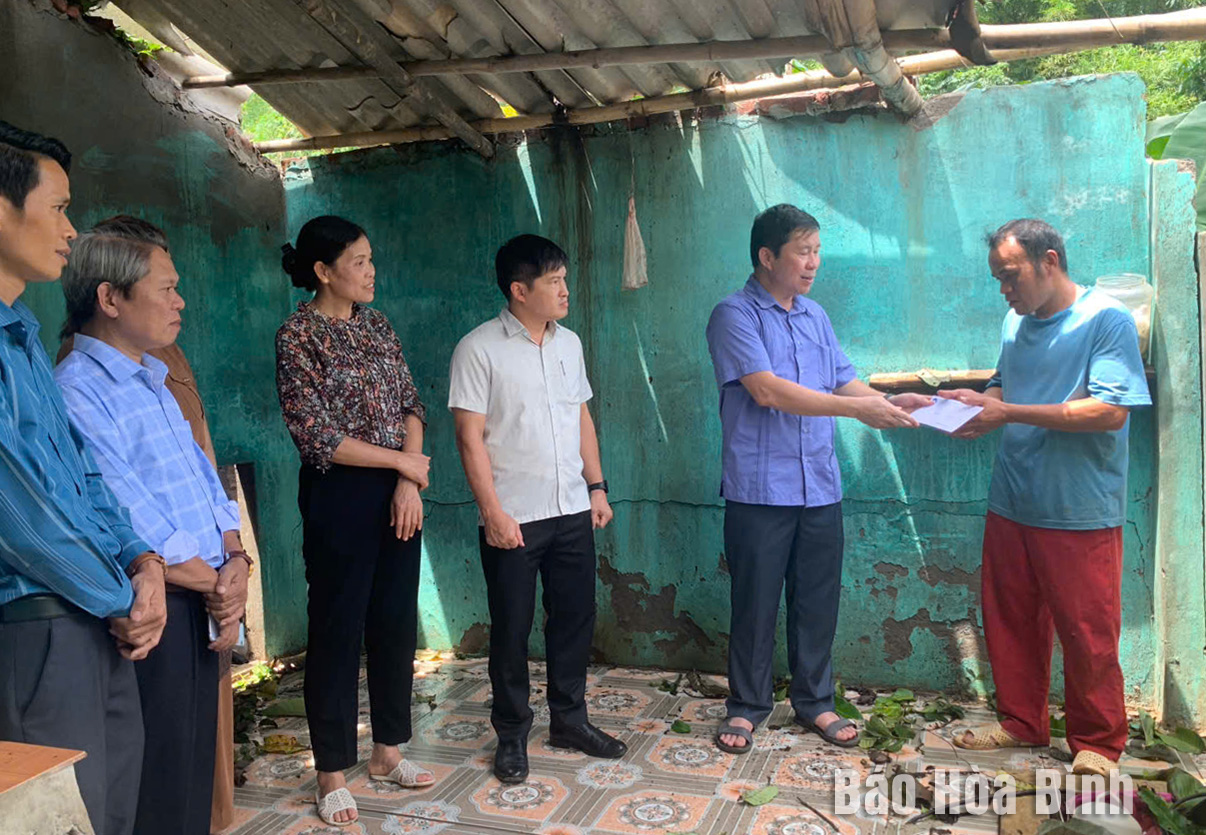
A delegation of the Vietnam Fatherland Front (VFF) Committee of Hoa Binh province on September 12 visited and presented relief aid to families affected by Typhoon Yagi in Lac Son and Tan Lac districts.

Leaders of the provincial Vietnam Fatherland Front
Committee visit and hand over relief aid to a family affected by Typhoon Yagi
in Phong Phu commune of Tan Tac district.
In Lac Son, the delegation offered aid, including 5 million VND
(204 USD) to Ban Van Tuan's family, whose home in Mai Son village of Yen Nghiep
commune was destroyed by the typhoon, and 2 million VND to Bui Thi Dan in Go
Cha 2 village of Yen Nghiep to repair her house.
Additionally, Bui Van Danh in Quyen village, Quyet Thang
commune, received 2 million VND because his home is located in a
landslide-prone area. The committee also transferred 7 million VND to support
14 households in the area.
In Tan Lac district, the delegation provided 2 million VND each
to three households in Phong Phu commune affected by the typhoon and subsequent
floods.
Leaders of the provincial Vietnam Fatherland Front Committee
urged local authorities and organisations to focus on recovery efforts, assess
the damage, and offer timely support to affected residents.
Hoa Binh province is undergoing a dynamic transformation amid Vietnam’s national digital transition. Building on Poliburo’s Resolution No. 57-NQ/TW on breakthroughs in science, technology, innovation, and national digital transformation, the province has rolled out a wide range of practical action plans. A standout initiative is the "Digital Literacy for All” movement, an effort to ensure that no one is left behind in the digital era.
Hoa Binh province is undergoing a dynamic transformation in the wake of the national digital transformation movement. Building on Resolution No. 57-NQ/TW of the Politburo on breakthroughs in science, technology, innovation, and national digital transformation, the province has implemented a wide range of practical action plans. A standout initiative is the "Digital Literacy for All” movement ambitious effort to ensure that no one is left behind in the digital age.
With a spirit of unity and proactive problem-solving, the Party Committee, the government and the people of Dong Lai Commune (Tan Lac District) have made great strides in implementing the resolutions of the 24th Party Congress of the commune for the 2020 - 2025 term. Focusing on leadership and practical actions, the commune has brought the Party’s resolutions into daily life, creating strong impacts and pushing the local development forward.
Amid the nationwide push for digital transformation, young people in Hoa Binh Province are stepping up as dynamic pioneers, applying technology to enhance Youth Union operations and expand the reach of youth-led initiatives. Through creativity and adaptability, Youth Union organizations at all levels have introduced a series of practical solutions, contributing to modern governance and community development.
In recent years, An Nghia commune, located in Lac Son district, has stepped up administrative reform, focusing on improving the quality and efficiency of its single-window service unit for receiving and processing administrative procedures. These improvements have helped create favourable conditions for local residents and organisations to handle administrative procedures, contributing to the commune’s broader socio-economic development.
The Prime Minister-approved master plan to develop the multi-use value of forests ecosystems through 2030, with a vision to 2050, aims to improve the management and sustainable use of forest resources, create jobs, increase incomes, and improve the living standards of ethnic minorities, people in mountainous and remote areas, forest workers and those living near forests.



